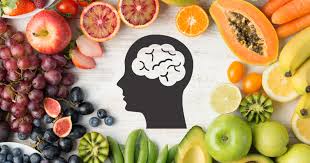Mental health is crucial for our overall well-being, and nutrition plays a big role in it! The foods we consume can significantly influence our mood, energy levels, and mental clarity. In this post, we will explore how certain foods can impact mental health and highlight key nutrients that support brain health. We will also suggest Ayurvedic dietary practices to help incorporate these nutrients into your daily routine.

Key Nutrients for Supporting Brain Health
- Omega-3 Fatty Acids and Mental Wellness:
Omega-3 fatty acids are essential fats that significantly impact brain function and mood regulation. You can find them in fatty fish like salmon, walnuts, and flaxseeds. Studies show that a diet rich in omega-3s may help reduce symptoms of depression and anxiety. Learn more about Omega-3 Fatty Acids at Healthline - B Vitamins and Cognitive Function:
B vitamins, including B6, B12, and folate, are crucial for brain health. They aid in producing neurotransmitters that regulate mood. Foods rich in B vitamins include whole grains, eggs, dairy products, leafy greens, and legumes. - Antioxidants and Brain Protection:
Antioxidants protect the brain from oxidative stress and inflammation. Foods like berries, dark chocolate, nuts, and green tea are rich in antioxidants. These foods not only enhance mood but also improve cognitive function. Learn more about stress in ayurveda here.
Ayurvedic Dietary Practices for Enhanced Mental Health
In Ayurveda, food is considered medicine, and the right diet can promote mental well-being. Here are some Ayurvedic practices to incorporate into your diet for better mental health:
- Incorporate Brain-Boosting Spices:
Spices like turmeric and ginger have anti-inflammatory properties that benefit brain health. Try adding these spices to your meals for flavor and health benefits. - Focus on Seasonal and Local Foods:
Ayurveda emphasizes eating fresh, seasonal foods that are locally grown. This practice can enhance the quality of nutrients and support overall health. - Stay Hydrated for Mental Clarity:
Drinking warm water or herbal teas can aid digestion and promote mental clarity. Herbal teas like chamomile and peppermint are soothing and can help reduce stress. - Practice Mindful Eating for Better Digestion:
Focus on your food, savor the flavors, and avoid distractions. This practice can improve digestion and enhance your relationship with food.
Conclusion
The role of nutrition in mental health is vital, and incorporating the right foods into your diet can significantly impact your mood and well-being. By including omega-3 fatty acids, B vitamins, and antioxidants in your meals and following Ayurvedic dietary practices, you can enhance your mental health and overall quality of life.


1 thought on “The Role of Nutrition in Mental Health”